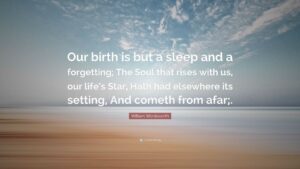Kathleen Raine in her essay on ‘The Use of the Beautiful’ discusses a story by Leo Tolstoy called ‘The Kreutzer Sonata’ where the hero ‘a sensual brute of an ordinary man’ is deeply affected by the beauty of Beethoven’s music, which comes to him as ‘a kind of torture, outrage and fear’:
‘It was as if new feelings, new possibilities, of which I had till then been unaware, had been revealed to me … the consciousness of this new condition was very joyous. All … appeared to me in a new light’.
What had he felt? He had experienced beauty and some kind of truth – a harmony and inner wholeness: ‘already and forever existing, something he already possessed, but as lying away in the dark.’ In the story the man rejects the glimpse of perfection which was not enough to transform his life. However, as Raine writes his momentary realization was also momentary self-knowledge, for ‘we ourselves possess beauty when we are true to our own being; our ugliness is going over to another order’ (Plotinus) –
‘…where ugliness is the absence of quality, form, unity; or as the philosophers say, reality. … The ugly and the vulgar enable us not to feel, not to think, not to live; they save us from the anguish of living.’
The music that the man in the story heard had a function, a transforming power to bring knowledge of the soul.
In contrast, the contemporary culture we live in, and to a certain extent that our society has chosen, is ‘death in small, painless doses’, and, as Raine adds, ‘fortunes are made selling it.’ Edwin Muir the poet, living in Rome and finding himself everywhere surrounded by the transforming power of beautiful architecture, sculpture and paintings, found himself contrasting the Eternal City with Glasgow where he had spent his youth. He was amazed to find everywhere ‘emblems, icons of the divine mysteries; an environment created not only for the needs of the body, but above all for the needs of the soul.’ Raine says that in such places where the needs of the spirit are met, we can feel instantly at home; this is not the same in large cities or ‘the wastes of suburbia’ where we are as exiles, living provisionally. ‘The needs of the body are met, but ‘the environment is intolerable … in the absence of the beautiful … alienation from something which they have never known.’
Notwithstanding Raine’s judgements which of course could be criticised on various counts, our cities are often built to alienate, and, as displays of money and power, which is incongruent with the ground of our being. I like the quote from Plotinus which Raine uses:
‘the soul itself acts immediately, affirming the Beautiful where it finds something accordant with the ideal form within itself … But let the soul fall in with the ugly and at once it shrinks from itself, denies the thing, turns away from it, not accordant, resenting it.’
But painful though it might be to remember a glimpse of the Beautiful, a sliver of the Truth and a recollection of some inner harmony with which the world is out of tune – it is even more painful not to remember.
